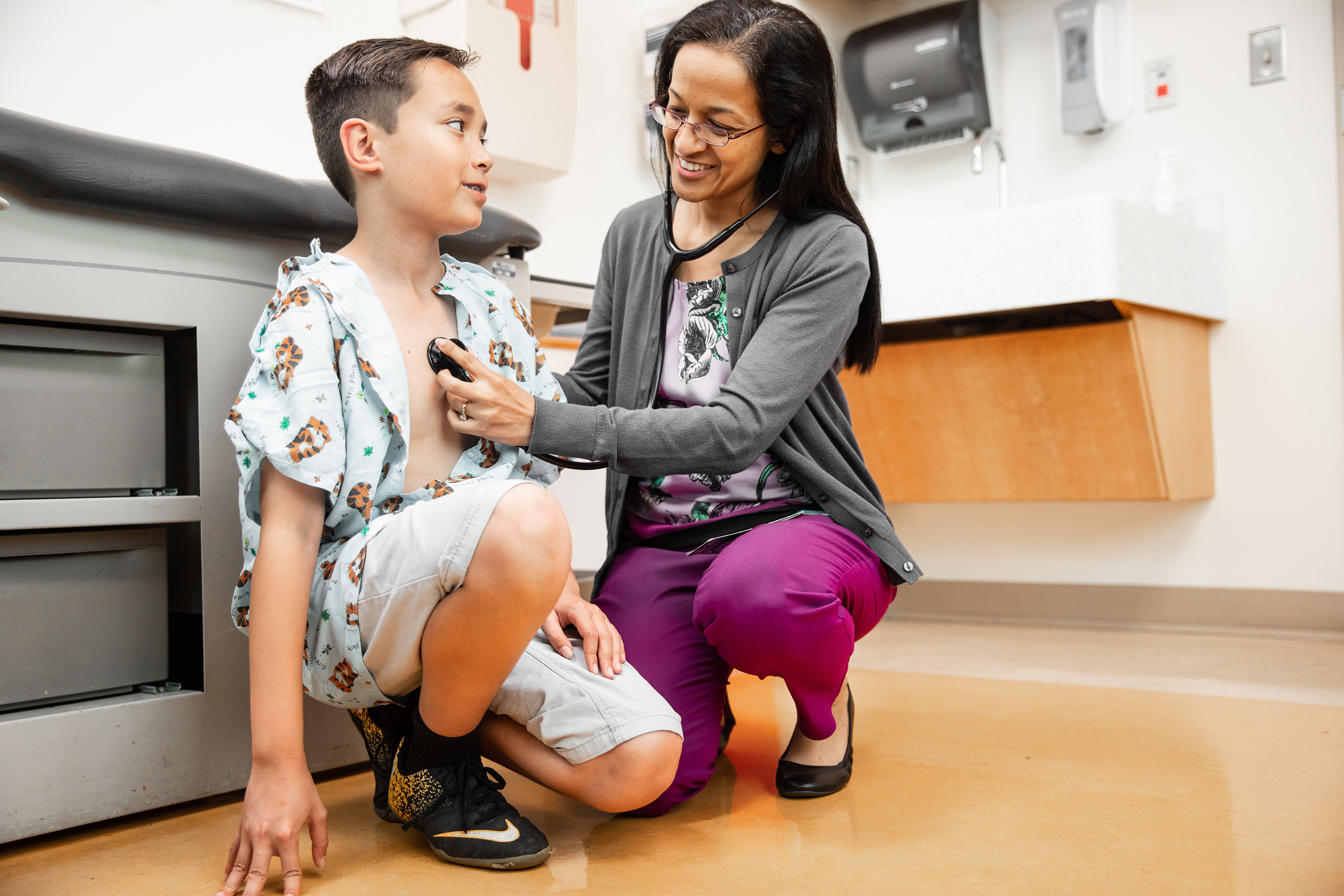
Celiac Disease Program
Five-Pronged Approach to Celiac Disease

- Family Resources
- Educational Videos
- Five-Pronged Approach to Celiac Disease
- Gluten-Free at School
- Gluten-Free Diet App
- Gluten-Free Podcasts
- Family Resources
- Educational Videos
- Five-Pronged Approach to Celiac Disease
- Gluten-Free at School
- Gluten-Free Diet App
- Gluten-Free Podcasts
Our nationally-recognized Celiac Disease Program brings together a team of expert physicians, nurses, nutritional consultants, a psychologist and education specialists dedicated to detecting and treating celiac disease in children and families.
Our goal is to attack celiac disease through improved diagnosis, treatment and awareness, using a five-pronged approach.
Our Five-Pronged Approach
State-of-the-Art Clinical Care
The only treatment for celiac disease at this time is to remove gluten from the diet. For some patients, starting a gluten-free diet can result in improvement in as little as two weeks. Our program will:
- Provide comprehensive care for patients and families using the most up-to-date methods
- Screen children for a broad range of celiac disease symptoms which are seen in all specialties at Children’s National
- Create a Celiac Registry and Database for education and research efforts
Meeting Psychological Needs
We strongly believe the mind and the body must be treated together to ensure the best outcome for our patients. Children and teens with celiac disease, as well as their parents, are at risk for mental health challenges and poorer quality of life, with about 50% of our families needing extra support. Psychosocial health services are offered in the form of integrated clinic consultations, brief follow-up interventions, outpatient therapy and coping skills groups. Services are offered both in-person and through telehealth technology to maximize convenience for families.
Evidence-based approaches, such as cognitive-behavioral therapy, are used to help children and their families:
- Adjust to the challenges of a new diagnosis of celiac disease and the gluten-free diet
- Reduce anxiety related to physical symptoms and potential gluten exposure
- Improve gut-brain regulation to improve healthy digestion, eating behaviors and digestive symptoms
- Gain communication and problem-solving skills to advocate for their celiac disease and dietary needs
- Navigate transitions in managing celiac disease across the childhood period through early adulthood
- Address general mental health concerns like anxiety, depression, ADHD and behavior problems
Education and Training of Healthcare Professionals
A crucial component of our approach is our Continuing Medical Education Program. We teach best practices for diagnosing and treating children with celiac disease to other healthcare professionals in the community.
Our program:
- Increases awareness of celiac disease and its potential for misdiagnosis
- Organizes educational seminars for all groups of healthcare providers across various medical disciplines; this includes hosting annual conferences to discuss new knowledge
- Encourages doctors to test all family members of affected children to identify anyone who has the atypical form of the disease
- Ensures that gastroenterology fellows at Children’s National have engagement with the Celiac Disease Program
- Offers formal psychology externship and internship positions doctoral-level graduate students to gain specialized skills on psychological consultation and treatment in celiac disease
Community Outreach and Advocacy
Building awareness of the disease and its symptoms among our patients and the general public will help prevent the dangerous consequences of ignorance or misdiagnosis.
Our program:
- Visits schools to educate nurses, teachers and students about celiac disease
- Develops outstanding educational resources for patients, families and community members to help with successful management of the gluten-free diet
- Creates a model for improving gluten-free diet compliance that includes innovative approaches to education including nutrition, cooking and grocery shopping
- Hosts annual community education forums that promote better understanding of celiac disease and the gluten-free diet, as well as build a robust and unified local gluten-free community
Research
Our active clinical research program focuses on improving the quality of life and treatment of children with celiac disease and their families.
Our program:
- Creates new approaches to diagnose, treat and support patients with celiac disease
- Fosters collaborative, interdisciplinary research projects that will increase the understanding of this complex disease and define new approaches to diagnosis and care
- Investigates the connection between celiac disease and other autoimmune diseases
Our current research includes:
- Understanding the burden on quality of life in celiac disease
- ADHD and gluten-free diet management
- Developing a behavioral treatment program to support teens and their parents
- The relationship between Down syndrome and celiac disease
- Creating a validated tool for measuring gluten-free dietary adherence
- Exploring the link between celiac disease and Hepatitis B vaccine responsiveness
- Patient satisfaction with telehealth
- Identifying new ways to conduct a gluten challenge
- Food insecurity for patients with celiac disease
- Measuring levels of gluten cross-contact in home kitchen settings and school settings



